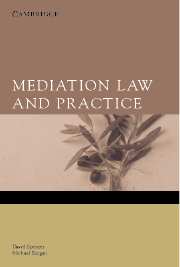Book contents
- Frontmatter
- Contents
- Acknowledgements
- Preface
- List of tables and figures
- Table of statutes
- Table of cases
- PART I THE PRACTICE OF MEDIATION
- PART II THE LAW OF MEDIATION
- 8 Mandatory Mediation
- 9 Confidentiality
- 10 Settlement Agreements
- 11 State Sponsored Mediation
- 12 Mediation Clauses in Contracts
- 13 Liability in Mediation
- 14 The Future of Mediation
- Bibliography
- Index
8 - Mandatory Mediation
Published online by Cambridge University Press: 05 June 2012
- Frontmatter
- Contents
- Acknowledgements
- Preface
- List of tables and figures
- Table of statutes
- Table of cases
- PART I THE PRACTICE OF MEDIATION
- PART II THE LAW OF MEDIATION
- 8 Mandatory Mediation
- 9 Confidentiality
- 10 Settlement Agreements
- 11 State Sponsored Mediation
- 12 Mediation Clauses in Contracts
- 13 Liability in Mediation
- 14 The Future of Mediation
- Bibliography
- Index
Summary
Introduction
Mediation is based on five central philosophies which not only determine its theoretical and practical basis but make it an attractive method for resolving disputes compared to other curial forms of resolution. According to Charlton, the five central philosophies that underpin mediation are (Charlton 2000, pp 14–15):
Confidentiality;
Voluntariness;
Empowerment;
Neutrality; and
A unique solution.
In relation to the philosophical element of voluntariness, it can be said that in order to maximise the effectiveness of mediation, parties need to come to the process voluntarily. David has called this the ‘willingness factor’ (David 1994, p 32). This means that parties must be willing to participate if they are to negotiate in an honest and frank way. If parties are forced to mediate then they may not have the necessary motivation to negotiate in a way that seeks to resolve the dispute. Further, if parties are not yet willing to seek a resolution because of a variety of factors, such as not understanding the alternatives to a mediated outcome, then forcing them into mediation at that time may be counterproductive. The following extract raises the arguments for and against mandatory mediation upon its introduction into New South Wales (Spencer 2000, pp 242–52).
- Type
- Chapter
- Information
- Mediation Law and Practice , pp. 265 - 311Publisher: Cambridge University PressPrint publication year: 2007



